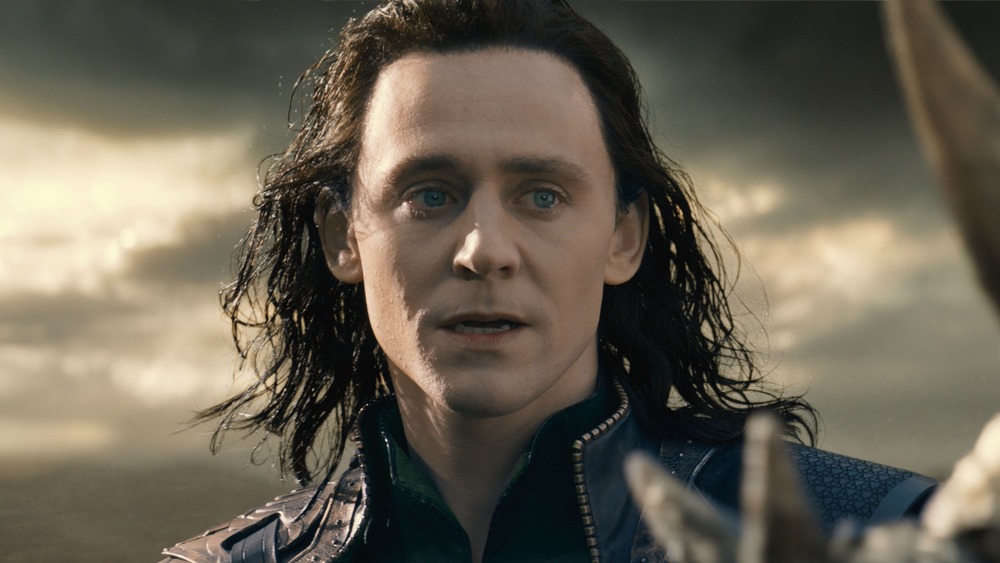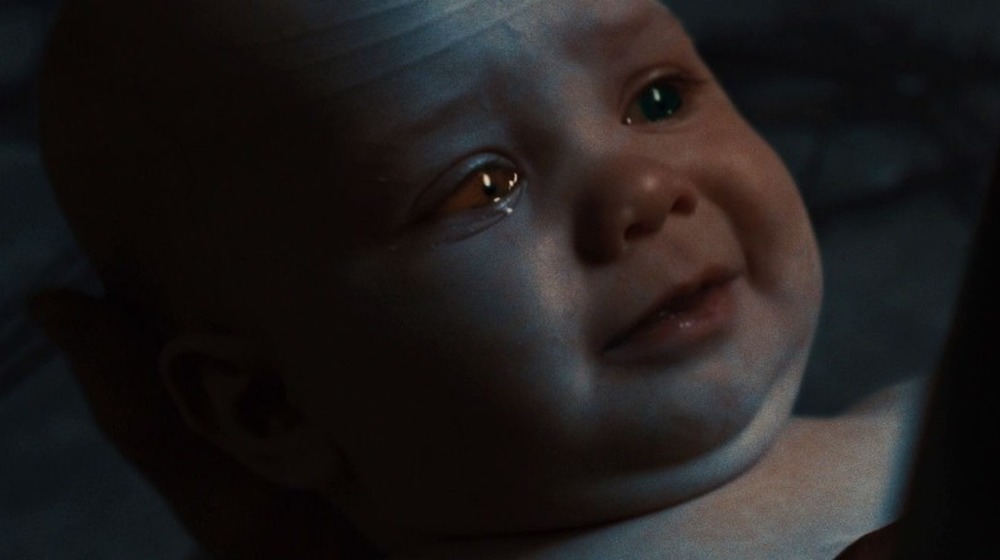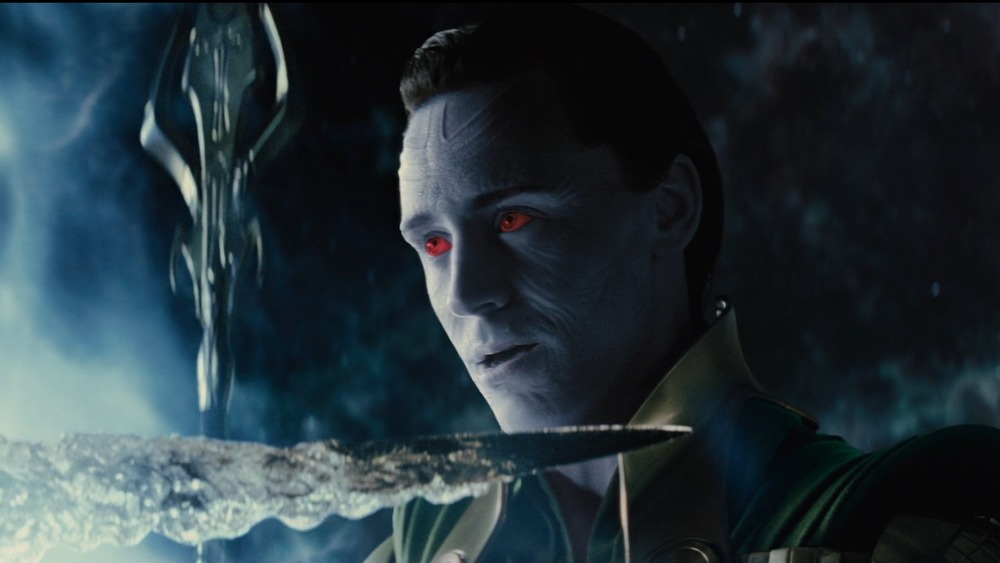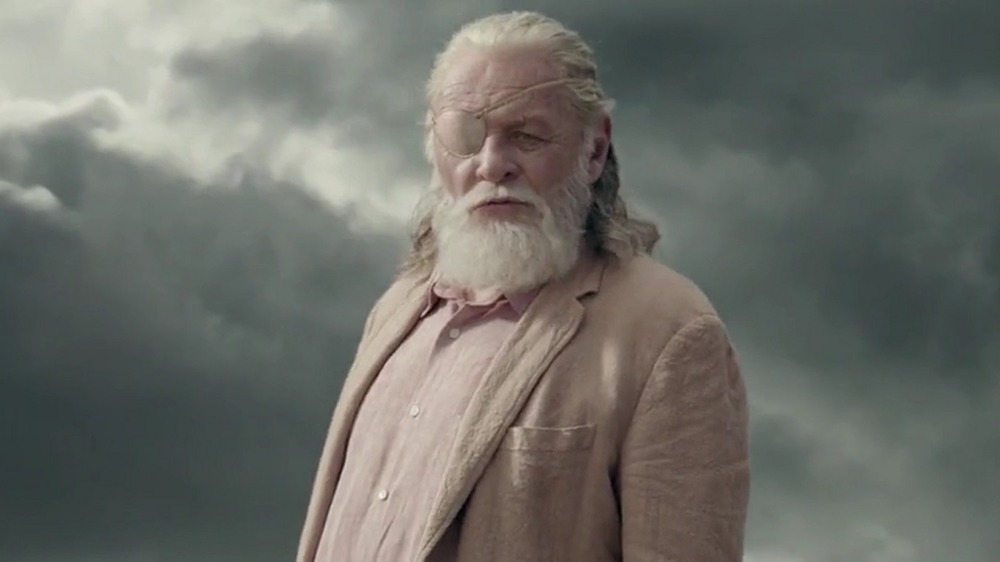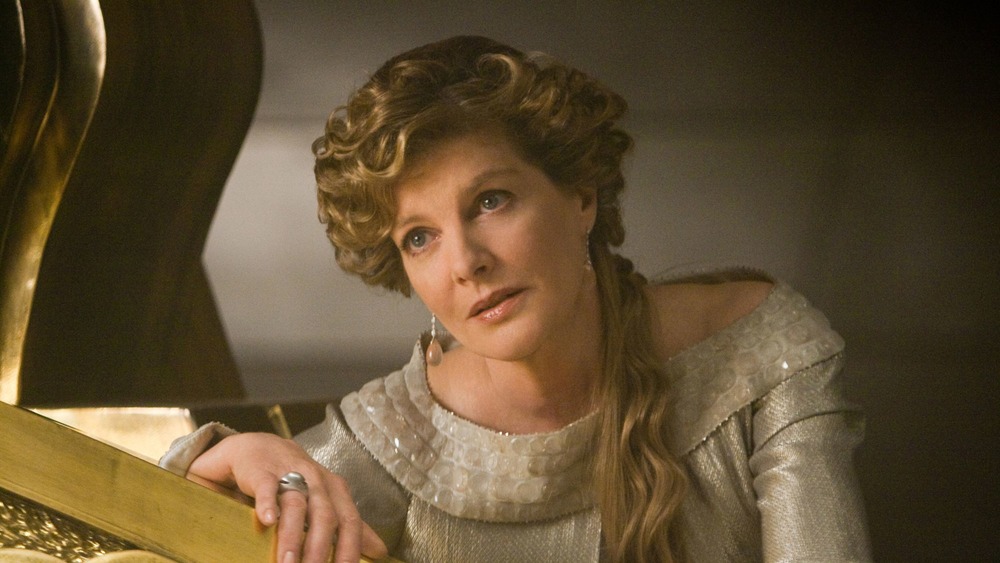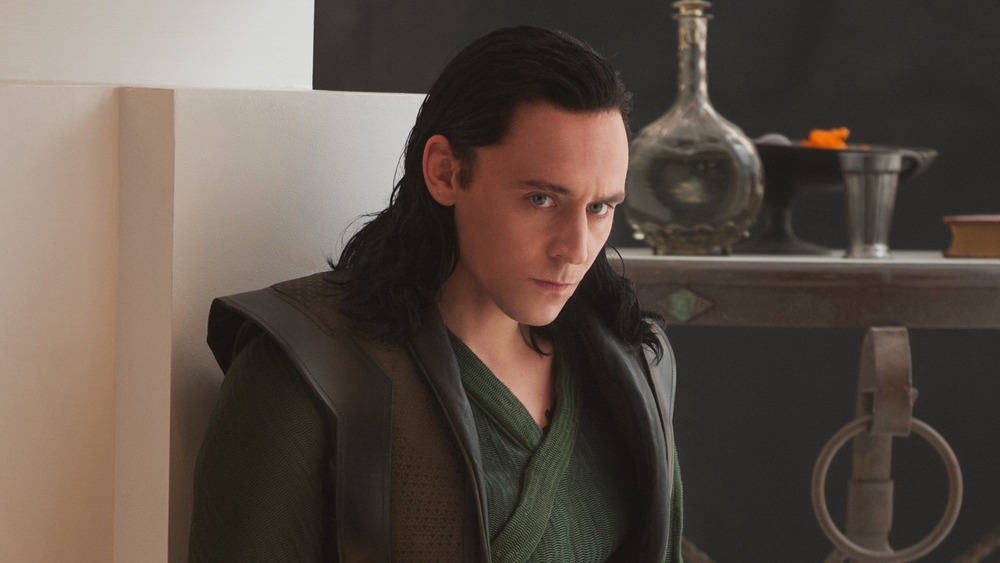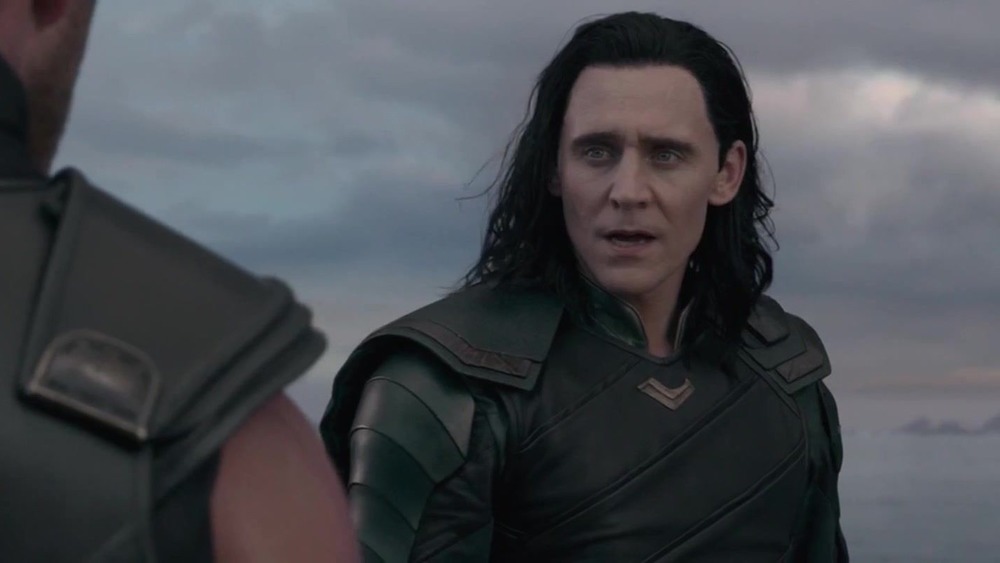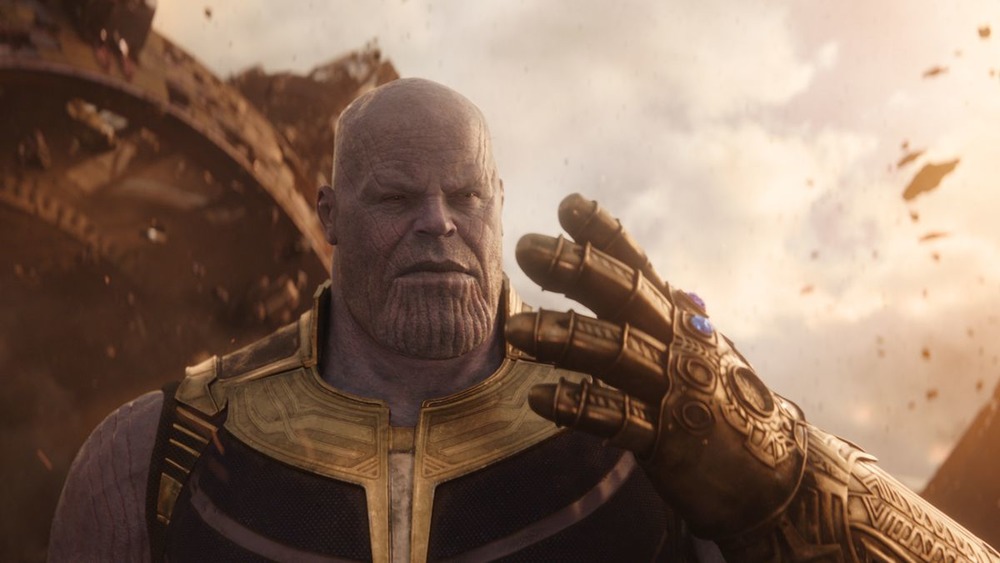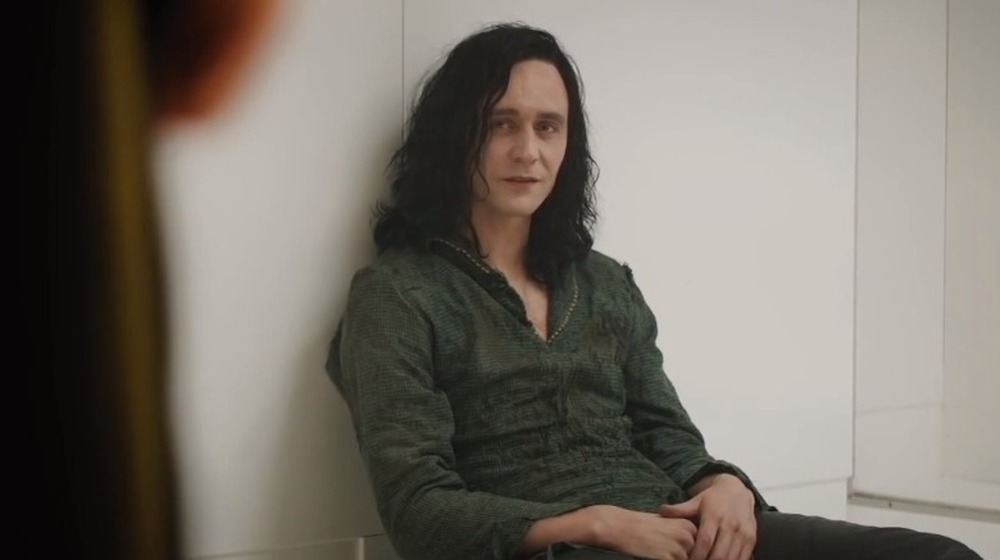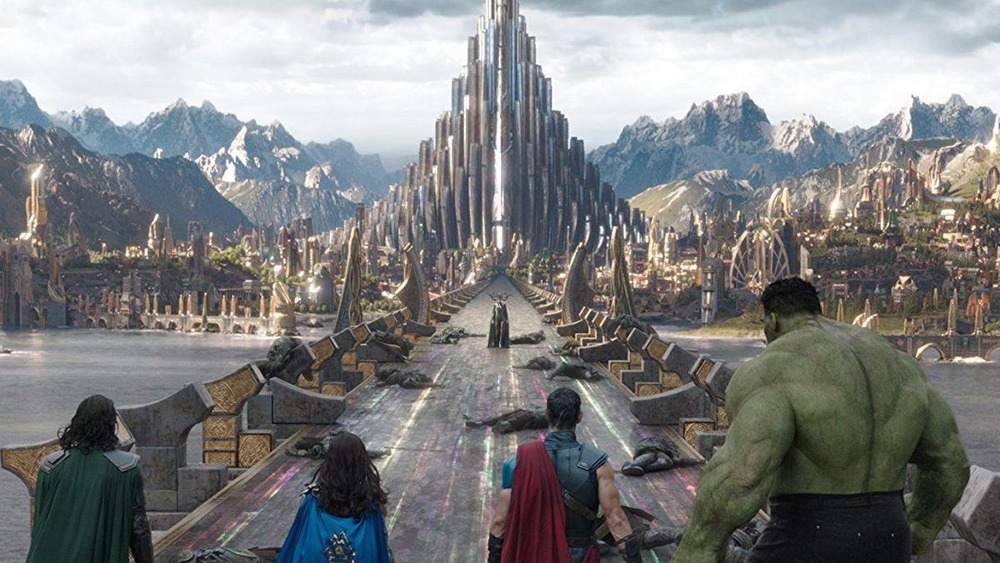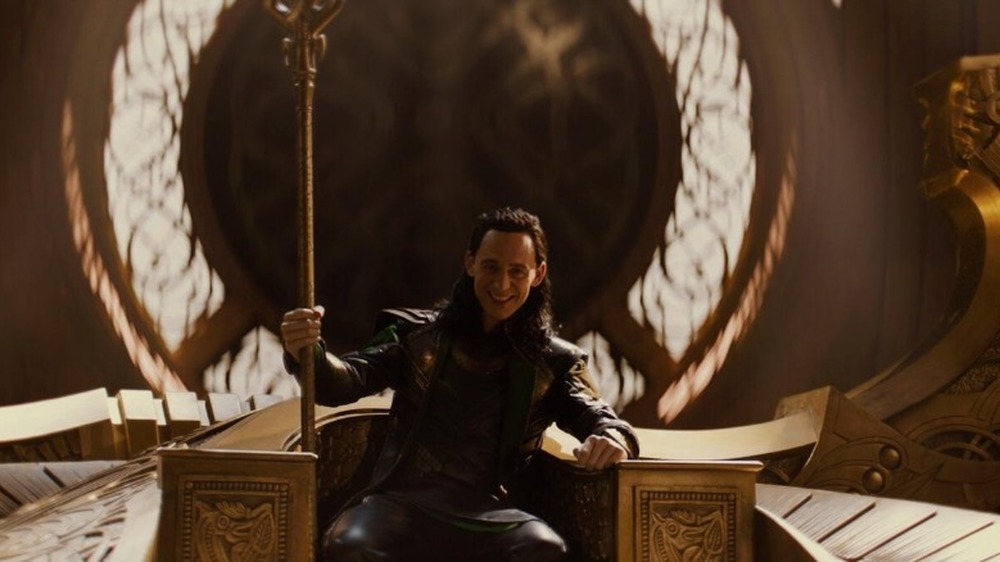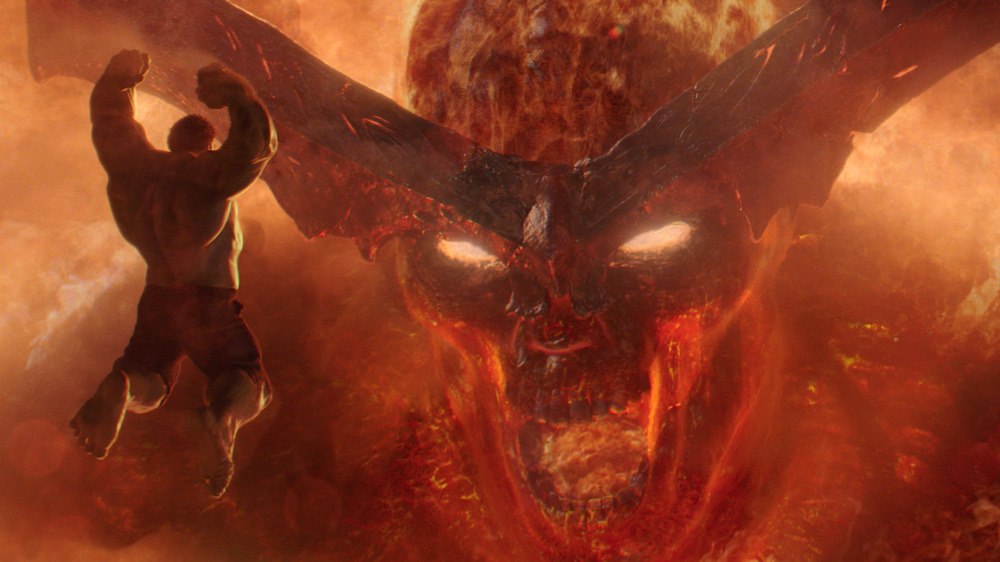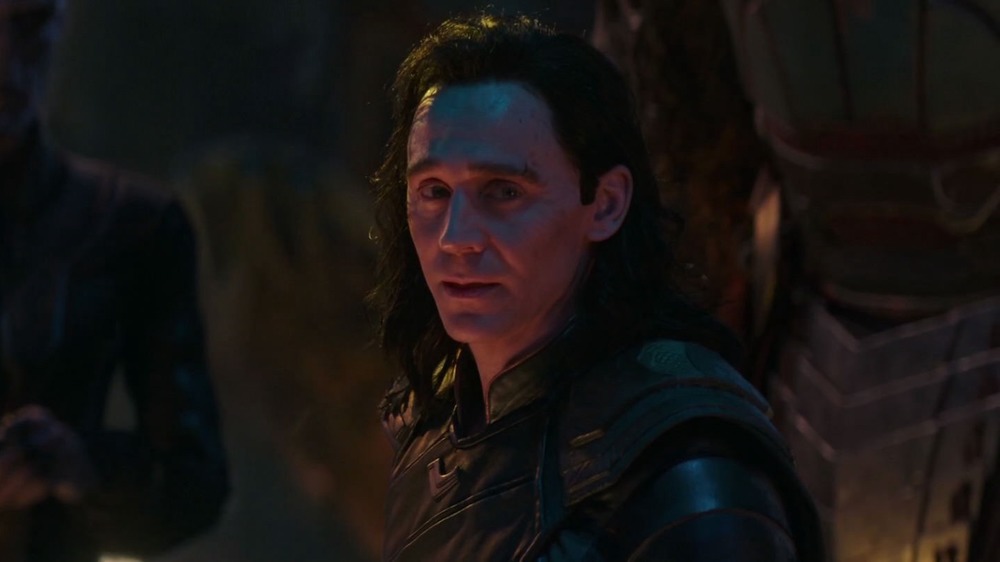Tragic Details About Marvel's Loki
Loki is a villain. Loki is good. Loki is both, or something else entirely. It's fitting for a trickster character who's expected to move seamlessly between roles and appearances, sometimes for his own benefit, sometimes for others.
In the Marvel Cinematic Universe, a lot of that complexity gets flattened. Moviegoers may think they saw a straightforward progression in Loki, from scheming villain of Asgard, to antihero, to actual hero. However, the Marvel story provides us with some truly tragic details you may have missed.
Those include lies about his birth, harmful parenting, mind control, space wars, unaddressed mental health, and an identity crisis at least once every movie. Asgard, the high-tech, magical realm that Loki calls home along with his adoptive brother, Thor, doesn't seem prepared to help people struggling with these issues. They definitely don't appear to have a thriving psychology community.
That's not to let Loki off the hook. He's committed some pretty terrible acts, most notably trying to take over the Earth in 2012's The Avengers, after hanging out with uber-villain Thanos for a while. The troubling behavior even started in childhood, according to Thor: Ragnarok, when Loki transformed into a snake and stabbed Thor for giggles. Once he became an adult, Loki didn't really have an excuse to continue this behavior, though you may wonder why no one stepped in once stabbing came into play.
Loki was an abandoned child
Loki was a child of war, born in the thick of a violent conflict between realms that had been going on for ages. According to the Marvel Cinematic Universe (MCU) wiki, Asgardian King Odin was the one to apparently finish up the war with the Frost Giants, around 965 A.D., after the Frost Giants had attempted to invade Earth.
Things didn't really stop there, says the MCU wiki, thanks to a fateful discovery made by Odin after battle. Entering an empty temple, he found a small baby on an altar. Unlike other Frost Giant children, this one was small and weak. This was the son of Laufey, the Frost Giant King, who was unwilling to raise such a child. Odin adopted the baby, named him Loki, and cast a powerful enchantment to conceal his distinctive blue skin and red eyes. Odin hoped that Loki would be convenient, perhaps one day ruling over the Frost Giants as a king friendly to Asgard.
Clinical and Practice Issues in Adoption points out that many people who are adopted develop anxieties centering on this first abandonment, even if their biological and adoptive families are loving and transparent. Odin, however, took another path that ultimately compounded this trauma. He raised Loki as his biological son, never telling him or his brother, Thor, the truth. When Loki inevitably discovered his actual heritage, the pain and grief of this revelation was all the more explosive for this lie.
Adoption trauma hangs over Loki's head
Though Loki didn't initially know that he wasn't Odin's natural son, there are subtle but significant ways the trauma of his adoption still affected him. Given that the infant Loki adopted by Odin appeared to be older than a newborn, there's a chance that some attachments had already been formed with his biological parents. HuffPost reports that even infants who are adopted early on in their lives may experience a "primal wound" when they've been separated from their birth parent, having grown familiar with their sensory input while still in the womb.
While an adoptee may not be able to articulate this, the possibility remains that they may sense something "missing." Perhaps Loki, even as he remained unaware of his biological origins throughout his childhood, knew somehow that his family was concealing something. The journal Pediatrics & Child Health also points out that the temperament of everyone involved, including the adoptive family, plays a significant role in shaping an adoptee's experience. Odin and his wife, Frigga, are both aware of the deception and choose to continue with it well into Loki's adulthood, subconsciously setting the stage for distrust and betrayal even before the truth comes out.
Loki's adoptive father is a mess
Movie-goers may at first be fooled into thinking Odin is a noble leader and parent, but look closer. His story is rife with shocking mistakes, like threatening to sacrifice Asgard to avenge his wife's death in Thor: The Dark World. His parenting is likewise truly awful.
CBR argues that Odin may in fact be one of the biggest villains of the Thor movie franchise. Not only did he essentially steal baby Loki and conceal his identity, but he kept mum about the fact that he had another daughter, Hela. The incredibly dangerous and power-hungry Hela didn't turn out well, but whose fault is that? Rather than confront the fact that his parenting produced an evil supervillain, Odin instead preferred to kick the can down the road and lock her away in a hell realm.
Fandom also points out the damning fact that when Odin finally reveals that he adopted Loki, it wasn't because he was moved out of love or even pity. He hoped instead that Loki would be useful if Odin could get him on the throne of Jotunheim as part of a puppet government. No wonder Loki's already teetering sense of loyalty comes crashing down in that moment, right alongside his own shattered identity. Odin's response? He falls into a convenient Odinsleep, where he gets to quietly lay in bed and ignore his problems while everyone else deals with his terrible choices.
Frigga isn't much of a mother, either
Though many like to point to Frigga, Odin's wife, as the adoptive parent that actually cared for Loki, their relationship has its dark side. Remember that she was in on the plot the whole time and kept up Odin's ruse even while it was clear that Loki was struggling through a troubled, isolated childhood. Yes, she briefly mentioned that she was against it all in the first Thor film, yet she never once spoke out for the sake of a son she claimed to love.
Even her love for Loki seems to have its manipulative side. AP Marvel points out that, once Loki has denounced Odin as his father, Frigga turns it around and asks if she is no longer his mother, too. Her question is meant to bolster her own sense of herself as a "loving mother" than it is to support her struggling son. She never manages to honestly confront the tremendous manner in which she's failed, which includes upholding a massively traumatic lie for centuries.
Though Frigga vocally professes her love for her adoptive son, Loki still represents a strategy as much as he is a living, intelligent being with emotions. Here is a child who might be "hers" in a way that the macho, sometimes belligerent Thor simply cannot be for her. A braver parent might have revealed the truth far sooner, perhaps heading off the mass chaos caused by the deeply damaged adult Loki.
The dualism of Loki could be tearing him apart
Loki is situated between many different worlds. He is, of course, stuck between two literal worlds — those of Jotunheim and Asgard. However, Loki's dual nature has seeped into other parts of his personality and upbringing in ways that could have also isolated him even further. Even things that could be seen as a unique skill in other circumstances may still have set him apart and increased his social isolation. The Discriminating Fangirl points out Loki's propensity for magic that comes directly from his adoptive mother. Frigga taught Loki everything about magic, making it a central part of their relationship.
Magic in the MCU is frequently coded as feminine, much as it often is in many real-world societies. Magical practitioners embody characteristics that, rightfully or not, are often read as feminine, like a high degree of emotion or empathy. That's not to say that men can't practice magic, or people should sweep away gender essentialism in the real world. Scandinavian Studies notes that old Norse magic in our reality played around with gender and had a variety of practitioners. That said, it's worth noting these prevailing cultural assumptions, both here and in the fictional world of Asgard.
Tricksters, meanwhile, are often portrayed as intrinsically between worlds. They're both good and evil, helpful and harmful, feminine and masculine. As both a traditional trickster character and a magic user, Loki would already be "strange" even if he were a natural-born Asgardian.
No one seems willing to address Loki's trauma
For adoptees, trying to understand their identity and place in the world takes a lot of work, especially if they're dealing with issues surrounding separation, abandonment, and more. They need family and friends who are willing and able to help them in this effort. The tactic employed by Odin and Frigga — in which they never said anything about the adoption and hoped Loki would be cool with it when revealing his heritage would be most useful to them — is, needless to say, ill-advised.
What would be a better path? According to the Post Institute, even infants and very young children could be aware of separation from their biological family and of the trauma of adoption. Caregivers should be sensitive to this and work to create an environment full of positive reinforcement. This includes providing plenty of affection, reducing environmental stressors, and seeking a supportive community. It's hard to imagine Odin, who is likely the most problematic figure in Loki's life, as a parent who's apt to give out hugs and one-on-one time on a regular basis. Maybe, if he'd taken the time to play catch or have an honest conversation with Loki, things could have been very different.
Loki was mind-controlled by Thanos
It's widely acknowledged that trauma is no excuse for abusive behavior, says relationship resource Love is Respect. While it's discussed there in an interpersonal context, this concept arguably applies to larger relationships with family members, friends, and the world at large. Loki, therefore, bears a certain level of responsibility for his actions once he became an adult, despite what was a clearly distressing childhood.
Yet, there's another layer of complexity at work in The Avengers, even when Loki is apparently trying to take over an entire planet. According to CinemaBlend, by 2018, Marvel had quietly updated Loki's official character biography to indicate that he was actually under some level of mind control the whole time. The culprit? None other than the Mad Titan himself, Thanos.
Apparently, the apparent agreement was that Loki would get Thanos the super-powerful Tesseract (also known as the Space Stone). In exchange, he'd get to lord it up over all of Earth. Only, Loki is seen sporting a scepter given to him by Thanos, which turns out to include the Mind Stone. Said stone has the ability to bring out the worst in people, amplifying Loki's bad aspects and leading him down ever-darker paths. Thanos knew exactly what would happen but likely conveniently forgot to ever tell Loki about the possible side-effects of that shiny new scepter.
Solitary confinement didn't help Loki's mental state
After he was apprehended at the end of The Avengers, Loki was whisked away to a solitary confinement cell on Asgard. To be fair, at this point in the Marvel Cinematic Universe, Loki was a dangerous criminal. He'd already tried to upend Asgard, nearly taken over Earth, and teamed up with Thanos. But was solitary confinement for life an appropriate sentence?
This sort of living arrangement can be incredibly punishing, especially for people who are already suffering from social and mental problems. In the real world, PBS Frontline reports that many cells are about 80 square feet and bare of anything but essentials. Inmates typically get only an hour of exercise outside each day. This sort of intense isolation can produce extreme results in prisoners, who might suffer from paranoia, hallucinations, panic attacks, obsessive thoughts, and memory problems, among many other issues.
For inmates who are already suffering from mental illnesses and social disorders, the effects of solitary confinement can be all the more crippling, says the American Psychological Association. Mental illnesses also appear to make inmates more likely to be placed into this type of cell. Psychology Today goes so far as to call it torture, with no equivocation. While Loki at least seemed to have more space in his cell, it's clear that the prospect of being stuck there for the rest of his life probably didn't help his mental or emotional state.
Asgard doesn't seem to have a good understanding of mental health
It probably wouldn't have made for a gripping scene, but you kind of wish movie-goers had gotten at least a hint that mental health professionals exist in Asgard. It's not just Loki who would have benefited from regular appointments with a therapist, though he may be one of the MCU's characters most obviously in need of professional help. Corissa Baker argues that Loki, who's been around for about 1,500 years by the time of the first Thor film, is in the midst of a massive identity crisis. If only there was a therapy practice somewhere that could help him manage that rage and grief.
In general, a mental health professional brave enough to work with super-powered beings could make a significant difference. Thor himself could use a good therapist. Even though he's the apparent favorite of Odin, he's received little true guidance from his father. At the beginning of Thor, he's an egotistical monster who's willing to go to war with Jotunheim for pride. By the time Thor is seen again in Avengers: Endgame, he's matured greatly but is traumatized by losing his family, his world, and failing to stop Thanos. It's shamefully played for laughs in the film, but, as Tor argues, Thor's pain shouldn't be dismissed. It's clearly a sign that even the most well-regarded of Asgard needs some help.
No one acknowledges that Loki might have been an okay ruler
Odin is not as great a ruler as the films will lead you to believe. He's a warmonger who stole away at least one baby for political purposes, who banishes his children left and right, whether it was the frightening Hela or the egotistical Thor. However, it at least appears that Asgard itself is doing okay under his rule (assuming his first attempt at kingship in Thor is forgotten). When Loki took over Odin's kingship by the end of Thor: The Dark World and ruled undiscovered for an extended period of time, he seems to have governed competently enough, too. According to CBR, he's done some heroic acts.
There are definitely some problems here, to be sure. Loki's rule is based on deceit, given that he's impersonating a king who, as revealed in Thor: Ragnarok, is placed in a human retirement home. Banishing Odin may be fair enough, considering what he's done, but it's not exactly the move of a beneficent king. Viewers can also sense the potential creep of authoritarianism under Loki's rule, like Heimdall's run-in with treason charges.
Still, the fact that almost no one caught on indicates that Loki did at least well enough to evade detection. Not much else is known about the years he was ruling under the guise of being good old Odin, but one might wish that there was more than a little peek at life under Loki's rule. It could be surprising.
Loki gets unfairly blamed for causing Ragnarok
Ragnarok, the world-ending series of events that eventually led to the destruction of Asgard, is often blamed on Loki. In looking at Norse myth, it's fair enough to blame the end of the world on this trickster god, who's rightfully mad about being tied up in a cave with a poisonous serpent and so joins up with the destructive giants. Inverse also reports that the most recent comics version of Ragnarok is the fault of a brutally violent Loki.
But, this is the MCU, where Ragnarok turned out to be a real team effort. Pinning it all on Loki isn't fair at all. In Thor: Ragnarok, Loki does indeed toss Surtur's crown into the Eternal Flame, empowering the fire demon to appear and begin ripping Asgard to pieces. Yet Loki's not acting alone, Time says, and in fact is acting on behalf of Thor, who has himself realized that Ragnarok kind of has to happen to save Asgardians and defeat the villainous Hela.
Loki dies without really resolving his issues
In Avengers: Infinity War, Loki faces off for the final time with his former collaborator, Thanos. Before the world-decimating Titan does away with him, Loki announces himself as Loki "Odinson" while making meaningful eye contact with Thor. Tom Hiddleston, who plays Loki in the films, says it's a meaningful moment, according to Comicbook. Loki's story comes "full circle" in that scene, Hiddleston says, when his character finally realizes that Odin loved him and Thor is worth saving.
Thor may indeed be worth saving, but AP Marvel is far more skeptical of this conclusion. In his final moments, Loki may think that all is solved, but is it? There never is a real reckoning, a true acknowledgement of all that went wrong on both sides. Simply saying he's an Odinson is a temporary band-aid, not a genuine solution. Psychology Today reports that childhood trauma like Loki's must be fully acknowledged. Moreover, the final stage of confronting it is to let things go, which Loki may not have done. This difficult, internalized grappling with pain and grief gets skipped over in favor of a cool space battle.
Marvel says Loki is really dead this time, CinemaBlend reports. But you might hope that he'll come back anyway and get a good therapist. Perhaps, in the upcoming Loki series set to premiere on Disney+, there will be some version of Loki finally coming to terms with the true nature of his family, his childhood, and his own decisions.
